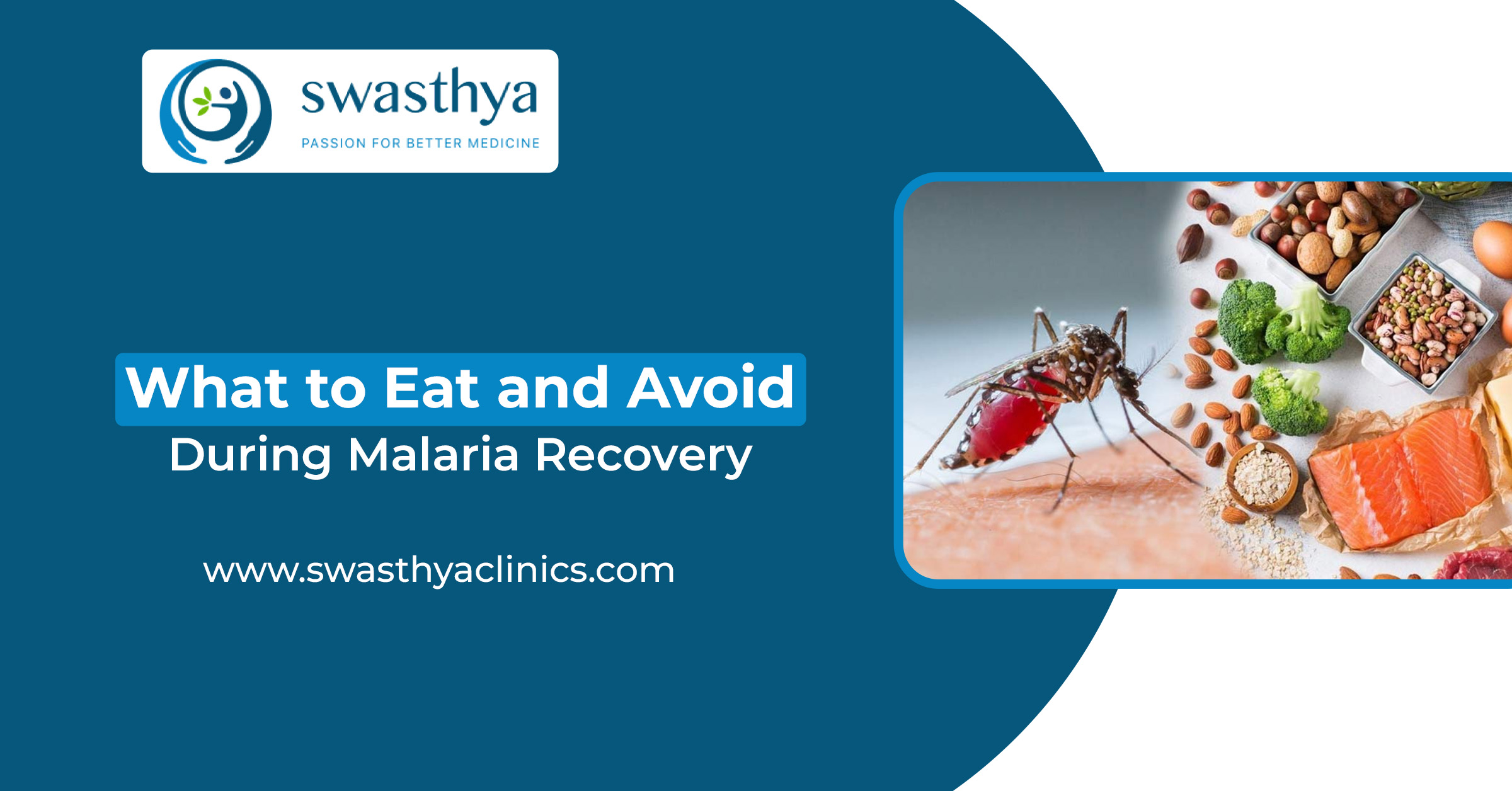-
Mail us
-
Mon to Sat
Call Us now

Book An Appointment
Swasthya Clinic, Jaipur is one of the advanced super-specialty clinics, that provides world-class treatment for asthma, allergy,diabetes, fever, joint pain, headache and migraine, etc. book an appointment now at +91 7300041110.

dr. Rahul Mathur
Associate Consultant - Internal Medicine
MD (Gold Medalist)

Dr. Raman Mathur
Experienced Emergency Physician In Jaipur
MBBS, DNB Emergency Medicine
What To Eat And Avoid During Malaria Recovery

- Admin
- Sep 16, 2025
Malaria is a life-threatening disease caused by parasites that are transmitted to people through the bites of infected mosquitoes. Even after the fever and acute symptoms have abated, the body is left weakened and requires time to recuperate completely. Besides medication, a proper diet is the key to helping the body regain strength, heal, and immunize. Let's dig into this blog, what to eat during malaria recovery.
Why Nutrition Matters After Malaria
Malaria leads to severe weakness, poor appetite, dehydration, and loss of nutrients, including iron, vitamins, protein, and electrolytes. Drugs help battle the parasite but also leave the liver with extra work to do. Good nutrition allows the body to heal after flooding, it can help maintain healthy gut function (which can be impaired if floodwaters are contaminated with sewage), and support the immune system. Without it, recovery is slowed and weakness lingers on longer than we’d like.
What to Eat During Malaria Recovery
Stay Well Hydrated
Fluid and mineral loss can be significant, resulting in a substantial amount of fluid and mineral loss due to fever and sweating.
Coconut Water: Full of natural electrolytes, including potassium and sodium, coconut water helps keep your body in balance and your energy up.
Oral Rehydration Solution (ORS): ORS can be used to replace lost salts and fluid, especially if you also have diarrhoea with your malaria.
Herbal Teas: Soft herbal teas like Tulsi or ginger tea strengthen digestion and pacify the stomach without forcibly stimulating immunity.
Soft and Easy-to-Digest Foods
When one has a delicate stomach, one should, therefore, eat such food as is soft and can be digested in the system.
Soups and Broths: Chicken or vegetable broth will provide them with minerals, hydration, and an energy source without adding too much volume to the stomach.
Steamed Veggies: Pumpkin, carrots, and bottle gourd provide easily digestible nutrients, assist in tissue repair, better digestion, and promote regular bowel movements.
Foods High in Protein for Repair and Strength
Protein is also essential for repairing and supporting the immune system during recovery.
Eggs: Soft-boiled eggs or poached eggs can be easily digested and provide good-quality protein to support body strength gain.
Lentils and Pulses: Moong dal, chickpeas, and other pulses are loaded with vegetarian proteins, and iron works for red blood cell formation.
Low-fat dairy sources: They include milk and yogurt, which contain calcium, protein, and probiotics that are beneficial for both the digestive system and bones.
Fresh Fruits for Natural Vitamins and Antioxidants
Fruit provides natural vitamins, minerals, and antioxidants to help with healing and building the immune system.
Papaya and Pomegranate: These are full of vitamin C and antioxidants that assist in repairing the body cells and boost the immune system.
Bananas: Potassium-rich bananas are easy on the stomach and replenish and rehydrate the body, maintaining electrolyte balance.
Watermelon and Oranges: Both will help hydrate and provide natural sugars to give you that tiny energy boost and help with recovery.
Whole Grains for Long-Lasting Energy
Whole grains yield slow-release energy, helping to maintain a stable energy level.
Brown rice and whole wheat bread: They provide the body with energy slowly, so there are no energy highs and lows.
Oats: High in fiber and gentle on the stomach, oats help promote steady energy and improved digestive health.
Healthy Fats in Small Amounts
Good fats aid in the regeneration of cells and the body’s ability to absorb vitamins.
Avocados and Olive Oil: Fats such as these assist the body in absorbing fat-soluble vitamins (A, D, E, and K) and slow down digestion to promote extended energy.
Almonds and Flax Seeds: Full of essential fatty acids and protein to support the natural healing process without weighing down the stomach.
Foods to avoid after malaria
You're very weak and need time to recover fully from malaria. While knowing which foods to avoid after malaria accelerates the recovery process and even one from acquiring malaria again, particularly in young children or elders.
· Fried and fatty foods, such as samosas, pakoras, and chips.
· Strong red meat, like mutton and beef.
· Alcohol
· Strong coffee and energy drinks.
· Fruits and vegetables that aren’t washed or cooked before being eaten because lead to infection.
· Spicy foods.
· Baked goods, fried foods, processed snacks, red meat, and sweetened soft drinks.
Final thoughts
Malaria recovery needs more than just rest and medicines — it also requires the right nutrition. Hydrating fluids, fresh fruits, whole grains, and mild proteins are your best friends; leave fried, processed, and heavy foods to prevent the liver from straining. So, for this, consult the Best Malaria Doctor in Jaipur for quality treatment and customized recovery plans.Book An Appointment
Please feel welcome to contact our friendly reception staff with any general or medical enquiry. Our doctors will receive or return any urgent calls.



